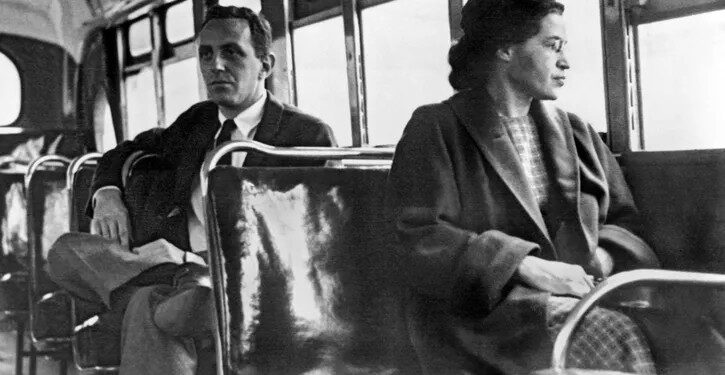On December 1, 1955, in Montgomery, Alabama, Rosa Parks made a decision that would become a pivotal moment in the American Civil Rights Movement. That afternoon, after a long day of work as a seamstress, Parks boarded a city bus and took a seat in the “coloured section” – the area designated for Black passengers under the city’s strict segregation laws.
When the bus began to fill up, the driver instructed Parks and other Black passengers to move further back to make room for white passengers. While other riders complied, Parks remained seated. Her quiet but firm refusal to give up her seat was an intentional act of resistance against the systemic racism that defined life in the segregated South.
Parks was not the first Black person to challenge bus segregation, but her specific circumstances and personal character made her an ideal symbol of the emerging civil rights struggle. A longtime member of the NAACP and an active community leader, she was respected in Montgomery’s Black community as a thoughtful and principled individual.
When the bus driver called the police, Parks was arrested and charged with violation of Montgomery’s segregation ordinances. Her arrest sparked immediate outrage in the Black community. Local civil rights leaders, including a young Martin Luther King Jr., saw an opportunity to challenge the city’s discriminatory transportation system.
The Montgomery Bus Boycott was organized in response to Parks’s arrest. For 381 days, Black residents of Montgomery refused to ride city buses, instead organizing complex carpooling systems and walking long distances to make their economic and social protest felt. The boycott not only challenged bus segregation but became a powerful demonstration of Black community solidarity and nonviolent resistance.
The U.S. Supreme Court ultimately ruled in November 1956 that Montgomery’s bus segregation laws were unconstitutional. This landmark decision was a direct result of Parks’s courageous act and the sustained protest it inspired.
Rosa Parks became known as the “mother of the civil rights movement,” though she always emphasized that her actions were not spontaneous but a deliberate stand against injustice. Her simple yet profound act of resistance helped catalyze one of the most significant social movements in American history, challenging deeply entrenched racist systems and inspiring generations of activists to fight for equality and human dignity.
newshub



Recent Comments